Columns
Montreal police arrested seven people who are believed to have ties to an Italian Mafia clan on Wednesday morning.
Published
1 week agoon
By
Ekwutos Blog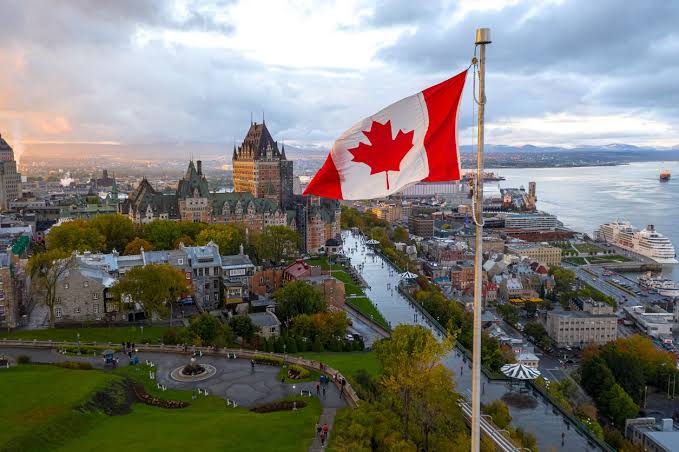
Six men, ages 34 to 59, and a 44-year-old woman were arrested, said the Service de police de la Ville de Montréal (SPVM). Around 40 officers were involved in the operation.
The arrests, which mark the final phase of the Americano Project, were made in the boroughs of LaSalle and Verdun, as well as in Brossard.
ADVERTISEMENT
“It’s going to hurt traditional Italian organized crime in this area,” Francis Renaud, head of the SPVM’s organized crime unit, told reporters on Wednesday morning.
“We’re used to seeing traditional Italian organized crime in the Saint-Léonard area … but in LaSalle, it’s a well-hidden stronghold.”
Who are the suspects
The seven individuals, whom Renaud believes to be the “most influential people” in LaSalle, operated under the radar, he said. They were very well-known by the LaSalle community and some of them owned businesses.
Large-scale drug trafficking of cocaine was their specialty, said Renaud, and their team would sell drugs to resellers. Their clients were from all over the province.
Francis Renaud
Francis Renaud is the head of Montreal police’s organized crime unit. (Ivanoh Demers/Radio-Canada)
Renaud added that the individuals collaborated with other known criminal organizations, groups that would’ve previously been considered “enemies.”
ADVERTISEMENT
“In LaSalle, it’s pretty special,” said Renaud.
“The Italian organized crime [there] are not afraid to mix with other organized crime that we know, the bikers, the Irish, to make their business go on. And they’re getting along. That’s the special effect of LaSalle.”
Various charges
The suspects will appear at the Montreal courthouse by the end of the day.
Five of them are facing charges of committing an offence for the benefit of a criminal organization, drug trafficking and possession of substances for the purpose of trafficking, according to the SPVM.
Previous phases of the criminal investigation, which began in August 2023, led to the seizure in January and May 2024 of more than 32 kilograms of cocaine, over $2.2 million in cash, four kilograms of crystal methamphetamine, 12 firearms and several other items of evidence, said the police.
Three individuals who were previously arrested as part of the investigation have already appeared in court and were released. Renaud said they will appear again in court “probably with slightly more severe charges” than the initial charges they were facing.He explained that Wednesday’s operation included wiretaps, video surveillance and investigators working day and night for two years.
Renaud said “of course” the organization will find replacements for those arrested, which will force his unit to launch another investigation.
“It’s our job to monitor the intel and to see [who] is coming in to take the place and do the exact same thing again, and see you guys in a year or two,” said Renaud with a smile.
You may like
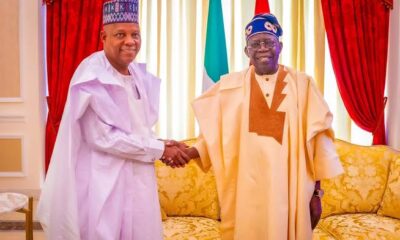

Northern Youths condemns Tinubu’s Alleged Refusal to Transfer Power to vice president Shettima
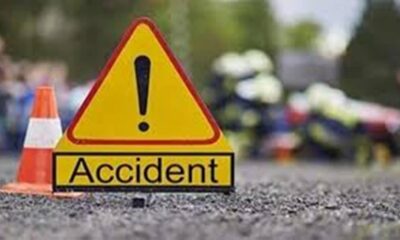

Multiple feared dead as cement truck crashes on Karu bridge in Abuja
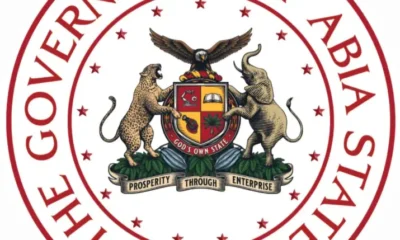

Airport Land Compensation: Abia govt denies ripping off villagers with Abuja attorneys
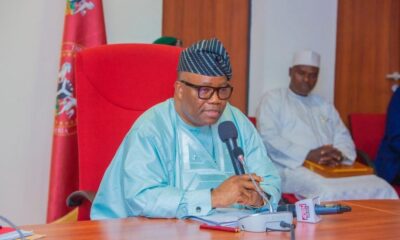

Akpabio harps on unity, progress of Nigeria at Easter


Drama as Bauchi Deputy Gov, Jatau slaps Foreign Affairs minister Tuggar


MURDER: NPF COMPLETES EXTRADITION OF BENJAMIN BEST NNAYEREUGO ALIAS “KILLABOI” TO FACE CHARGES As IGP Appreciates AGF, INTERPOL, Assures of Diligent Prosecution
Columns
Reject agents of division, exclusion – Fashola to Nigerian youths
Published
2 days agoon
April 17, 2025By
Ekwutos Blog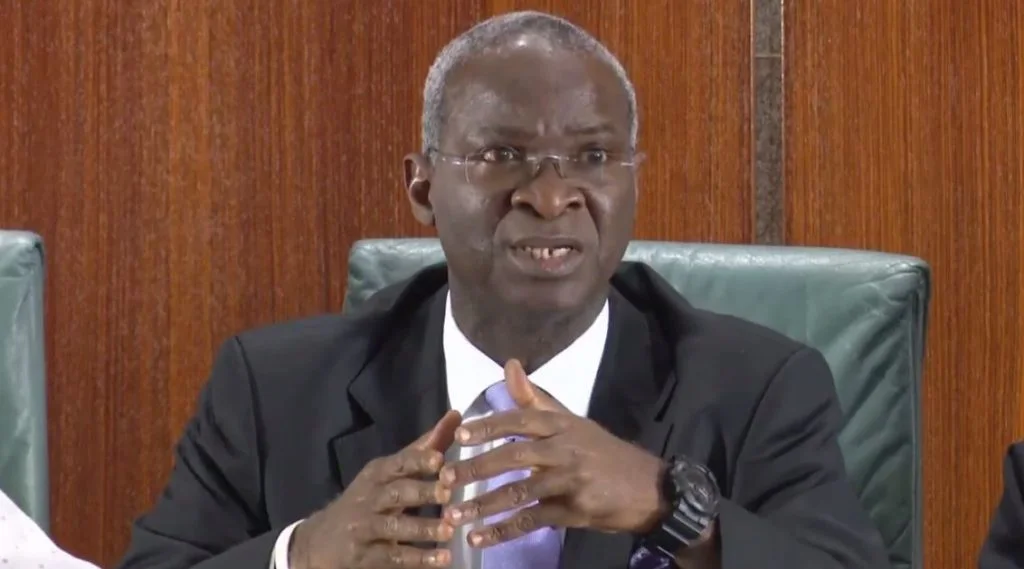
A former Governor of Lagos State, Babatunde Fashola, has advised Nigerian youths to reject those he described as agents of division and exclusion.
The former Minister of Works and Housing said the youths should focus on shared values in an era increasingly defined by identity politics.
Fashola made the call in Lagos State while addressing the state’s Leadership Summit 2025 with the theme “Transformative Leadership: Development-Responsive, Adaptive and Inclusive Models”.
Speaking on the topic: “The Inclusion Imperative: Why No One Wins When Leadership Leaves People Behind”, Fashola emphasised the importance of unity and inclusiveness.
He noted that the 1999 Nigerian Constitution already contains strong provisions that promote national cohesion and inclusion.
The former Minister pointed out that it was important that leaders across all levels collaborate in giving practical meaning to the constitutional imperatives.
Fashola said that true leadership lies in ensuring that no one is left behind, regardless of ethnic, religious or political affiliations.
Speaking earlier, the Governor of Lagos State, Governor Babajide Sanwo-Olu, chief host of the event, reiterated his administration’s dedication to good governance and pledged to use creative leadership, culture.
Sanwo-Olu, said he had been lucky to take forward the aggressive leadership of past leaders and had been able to innovate, urging people to get good education and do well in whatever assignment and level they find themselves.
Columns
Why Nigeria’s maritime cadets still struggle with global certification – NSML MD
Published
3 days agoon
April 17, 2025By
Ekwutos Blog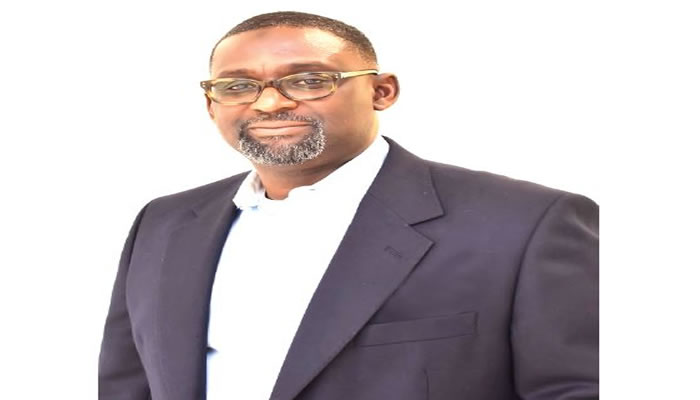
In this interview, with ANOZIE EGOLE, the Managing Director of the NLNG Shipping and Marine Services Limited, Mr. Abdulkadir Ahmed, speaks on the challenges with the Nigerian Seafarers Development Program, among others
You said 2024 was a good year for NSML. Can you tell us how?
I can tell you it was our best year, whether from a profitability point of view or an operations point of view. But actually, what we are even most proud of is that it was our best year from a safety point of view. For us, the profitability bit is just on the side, it’s what we call the icing on the cake. We are in business primarily to deliver on those core tenets of why we were set up. To run a safe business, provide safety, ensure the assets under us are managed reliably so that they can be available, and create value. Now, value isn’t just about finances. Value is the service that we provide to our customers, to our stakeholders. So when we say it was our best year, it was our best year financially, but most importantly, it was our best year operationally and safety-wise.
To what extent have you achieved your Nigerianisation policy?
We have a Nigerianisation objective or goal that we have defined a very long time ago. We are a Nigerian company and, of course, we were created to provide opportunities for Nigerian seafarers to participate in the Liquefied Natural Gas shipping industry. So we defined a Nigerianisation objective, which is that we want to have, at every moment, 85 per cent of our crew onboard our vessels, Nigerians, across all cadres. Again, it’s about ensuring that we are open to the world. The shipping industry, by its nature, opens up to the world. When I talk about standards, it’s a global standard. And you want to have a cross-fertilisation of cultures, of ideas. I hope you understand what I’m saying. So that was why we kept 15 per cent, to say we would have other nationalities. And today, we have Polish, Ukrainians, Indians, Malaysians, and Filipinos, on our vessels. And it helps, when you go there, it’s one family, everybody is an NSML staff. You don’t have NSML Nigerian staff, everybody is NSML staff. They go on board, they work together, they collaborate, they run the vessels, and they run them professionally. We were able to attain our 85 per cent two years ago. So, for example, people will leave, that’s normal, people will be promoted, and we will have additional vessels to manage. We have been growing our vessels under management consistently. We just took a new, advanced mega vessel, called Axios, It’s a mega vessel. It’s a sister vessel of the Arcturus. Remember the Arcturus that we took last year? So we took a new one, just last month. We took a new vessel under our management. And it’s something we’re proud of. It’s one of the most advanced LNG vessels in operation in the world today. We are one of the few, as small as we are, of the few, technical ship managers with that kind of vessel under management. And we are providing opportunities for Nigerians to sail on those vessels. So, from a Nigerian point of view, we are very happy with where we are, as a company. We have met our targets; we aim to exceed those targets. But from the office side, we are 100 per cent Nigerians in the office. The entire leadership, the entire crew, and the staff members in the office are Nigerians.
Tell us more about the cadetship program?
Now, the Nigerian Maritime Administration and Safety Agency is the co-sponsor of Nigerian cadets, under the Nigerian Seafarers Development Program. Part of their certification program is to go on board, and have their sea time and that is a very fundamental aspect of their certification. So they go to the colleges first, then they go on board, and then they go back to the colleges for their final exams. So we, in conjunction with NMASA, have been one of the most consistent, in terms of providing sea time, for Nigerian cadets. So far, almost 300 cadets have sailed on our vessels, and we take this very seriously. Because it is in line with the desire to deepen the Nigerian maritime sector. We are one of the few companies with ocean-going vessels in Nigeria today. We are the only LNG technical management company, I dare say, in Sub-Saharan Africa today. So the opportunity that we give them to be on those vessels is top-notch. But most importantly, it is also a funnel for us. They come on our vessel, they train on our vessel, and we imbibe them with our standards, with our culture. And they go back to their colleges, and finish, and we can also, where the opportunities are, recruit from that group. And so far, almost 100 have been recruited within NSML. So we are very proud of that. I am sure some of you were here when we had the induction program for the Romanian Cadets, and those are people who unfortunately went to Romania and finished, but unfortunately, their certifications were not recognised. We stepped in to provide a solution to NIMASA, which is simply that they will go on our vessels, and I think about 65 of them are already on the vessels. They are about to finish their sea time, and then they will go to a maritime academy in the United Kingdom for their certification. So we are exploring multiple ways, to provide solutions and provide opportunities.
Tell us about your collaboration with the Maritime Academy of Nigeria, Oron?
Now we collaborate with the Maritime Academy of Nigeria, Oron. In 2014, if I remember correctly, we actually went to the school, evaluated their curriculum, identified their needs, and supported the upgrading of their facilities then. Some of our top management today all went to the maritime academy. The first Nigerian LNG Captain went to a maritime academy. We got him from there, and we sent him on further courses. So we have a good relationship with the maritime academy. And currently, we have even developed a program where we’re taking their cadets for industrial attachments. I think currently we have about 20 students from the school on industrial attachment, and this is the first time we are taking students on that from MAN, Oron. All to ensure that we provide a platform for their training and development. Now, there is a fundamental problem, but then, we are all in business to solve problems. The problem is the certification, the NMASA-accredited certification. Unfortunately, the NMASA-accredited certificate is not recognised internationally for ocean-going. So, maritime academies, as good as they are, in terms of their facility and their curriculum, at the moment, we do have a certificate recognition problem. But that’s something that we are discussing, and we are working with NMASA to find a way to resolve that. It’s more of an organisational issue than anything else. It’s not a quality issue. Let me be very frank, it’s not a quality issue; it’s a quality assurance issue. I hope you understand what I am saying. I may believe you are good. But my word would not count for somebody else. Somebody needs to have said, okay, what is the assurance process to ensure, you are good today, and you will be good tomorrow. And that is where the discussion with NMASA is going on. How do we support NMASA to upgrade their systems, their processes, to ensure others internationally can come in and say, yes, we believe, and we assure ourselves that your systems and processes of accreditation are good? It’s just a matter of perception. So those works are still ongoing. Unfortunately, because we are ocean-going, our vessels call at various international destinations. We cannot have NMASA-trained officers with Certificate-of-Competency on those vessels yet, because those certifications are not fully accepted internationally yet. But we are working towards that. We can resolve the ratings certification.
Is it safe to say that with your certification, you can take and train cadets on your own?
There’s a Maritime Academy, which is the baseline. That’s the baseline institution for the provision of maritime training. The Maritime Centre of Excellence is an Advanced Marine Training Institute. So, it’s like going to university, let’s put it to university, they are the only ones that will issue you a degree certificate. But with all the necessary certifications to ensure that your degree remains relevant and up to date, you can go to other institutes. That’s what MCOE is. So, we are not competing with the Maritime Academy or other maritime institutions. No. We are rather complementary. They are the ones that provide the basic training and COC certification. What then happens is that the additional courses over and above what you can achieve, which we are seeing now, have been accreted for a couple of those courses. And that’s what MCOE aims to be: an advanced maritime training institute that can provide advanced maritime certification in specific courses. Then we aligned ourselves with the MCA. The MCA is the UK Coast Guard and Marine Agency. They are accredited; it’s deemed to be the gold standard of maritime certificate accreditation in the world today. So, we have a partnership with an institution in the UK. The plan in place this year is to upgrade the MCOE both in terms of facility, resources, and courses so that the centre itself is 100 per cent accredited by the MCA. And what we then intend to do in doing such is that anybody who is a seafarer who needs advanced certification doesn’t have to go to the UK or anywhere else to go and get that today, they can come to MCOE. Like I said, it’s, again, it’s a plan, we haven’t implemented. First of all, we have to upgrade the centre, but we have started. Part of that is that we have achieved accreditation of two courses. They have done an audit of our facility. They have identified the things that we need to do. We need to have more. They have acknowledged what we have, and that’s why they have accredited those two courses. But we want to go beyond specific course accreditation. We want to go for full centre accreditation, which is why we are upgrading the facility. We are increasing the courses and the resources provided to MCOE to be able to do that.
You don’t need to go anywhere to go and do it, you can come to Bornny and do it, and it’s as good as you have gone to the UK to do it. MCOE doesn’t provide the COC what we are providing is, when you have the COC, is the additional certification. For example, the COC will not give you a basic tanker course.
Columns
Plateau killings: Declare killer herdsmen terrorists – Ex-military administrator tells FG
Published
1 week agoon
April 12, 2025By
Ekwutos Blog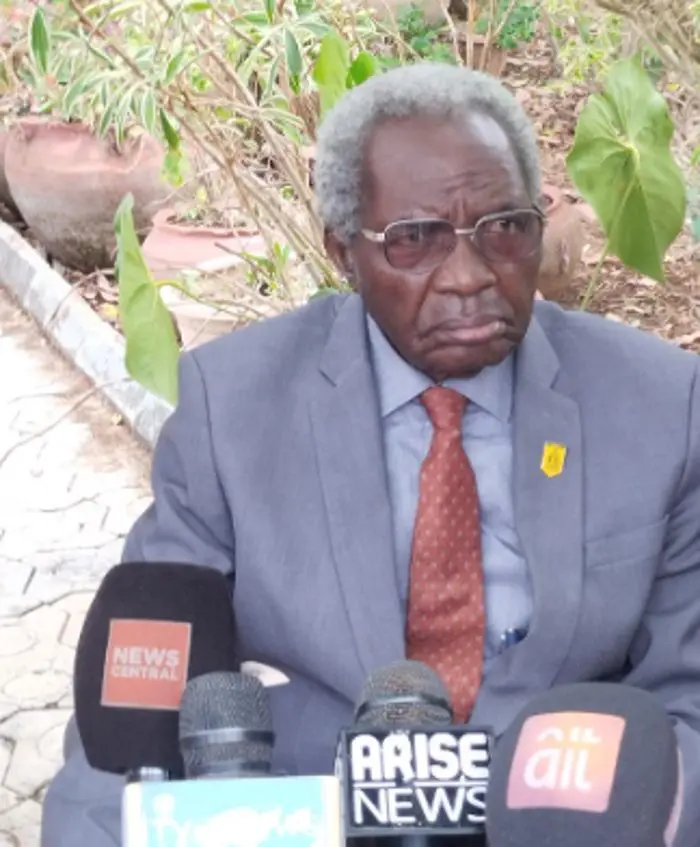
A former military administrator of Plateau State, Real Admiral Bitrus Atukum (rtd) has called on the Federal Government to declare the Fulani herdsmen attacking communities in the state as terrorists.
He said the target of the assailants is to keep the citizenry under perpetual poverty.
Atukum equally accused the killer herdsmen of “economic sabotage”, noting that they attack mostly when the planting and harvest seasons are approaching.
He equally observed that another reason for the attacks is purely land grabbing.
The retired army officer lamented that government is fighting insecurity on the Plateau with kid gloves.
Atukum’s comments followed recent killings in Bokkos LGA of Plateau State.
Ekwutosblog recalls that over 50 people were recently killed, thousands displaced and their means of livelihood destroyed in some communities of Bokkos LGA.
“The endless attacks on villages by the Fulani is a strategic act of terrorism, as such government should note this and label them as terrorists who are not only at war with armless and harmless civilians, but the country as a whole,” he said.
Atukum called on the citizens to defend themselves against the aggressors to protect their ancestral lands.
The former military administrator also decried last Tuesday’s press briefing held in Kaduna by one Garba Abdullahi Mohammed, a leader of Fulani groups.
“All these details given at that press briefing can be verified; government has relevant information as to where it can start the investigation.
“You cannot allow people under the pretext of the freedom of speech to be making this kind of statements, few days after the killings in Bokkos. These are unprovoked attacks!
“In the past, they used to say farmer-herder clash. How can you have clash in someone’s bedroom?
“Government is fighting this insecurity on the Plateau with kid gloves.
“I would have expected that on the Plateau, where you have hills and small mountains that are being inhibited by these Fulani herdsmen; what is the difficulty in ordering the army to and fish them out there?
“These people come down from these hills, commit havoc and disappear, and that is where they hide their weapons.
“So I just believe in addition to what the government is doing, they can do more,” he stressed.

Northern Youths condemns Tinubu’s Alleged Refusal to Transfer Power to vice president Shettima

Multiple feared dead as cement truck crashes on Karu bridge in Abuja

Airport Land Compensation: Abia govt denies ripping off villagers with Abuja attorneys
Trending

 Trending6 months ago
Trending6 months agoNYA demands release of ‘abducted’ Imo chairman, preaches good governance
- Business6 months ago
US court acquits Air Peace boss, slams Mayfield $4000 fine

 Politics6 months ago
Politics6 months agoMexico’s new president causes concern just weeks before the US elections
- Entertainment6 months ago
Bobrisky transferred from Immigration to FCID, spends night behind bars
- Entertainment6 months ago
Bobrisky falls ill in police custody, rushed to hospital

 Politics6 months ago
Politics6 months agoRussia bans imports of agro-products from Kazakhstan after refusal to join BRICS

 Politics6 months ago
Politics6 months agoPutin invites 20 world leaders
- Politics1 year ago
Nigerian Senate passes Bill seeking the establishment of the South East Development Commission.

